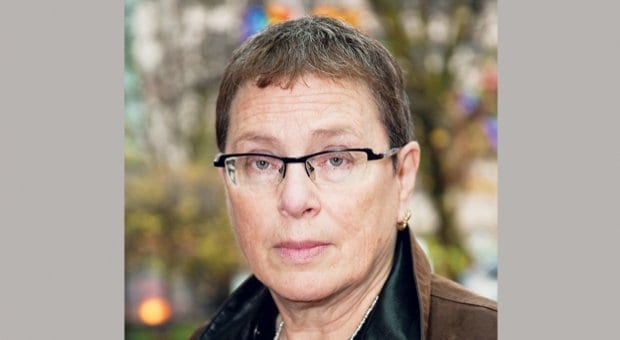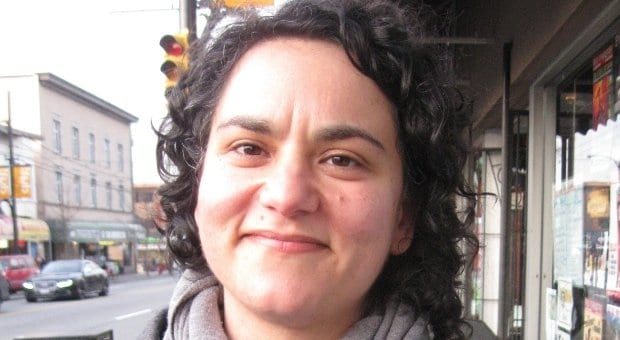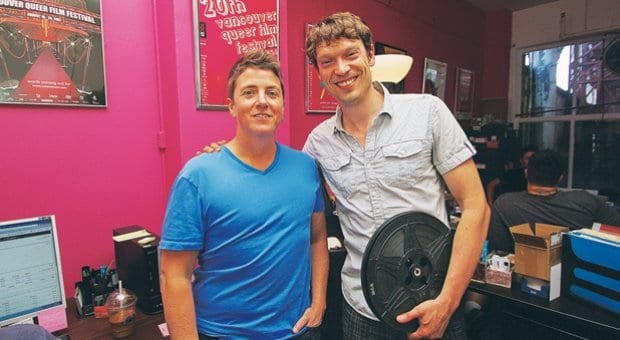
“It’s that sense that you’re in an audience that gets it,” says filmmaker Aerlyn Weissman. Credit: Janet Rerecich

Program director Shana Myara. Credit: Shauna Lewis
On Aug 8, 2002, Jamie Rokovetsky decided, in “a flash of panic,” to err on the side of caution.
He ran up to the Capitol 6 Theatre projection booth, stuffed two 10×8 tapes into a backpack, and hopped on his bike.
For an hour before its world premiere at the opening gala of the 14th annual Vancouver Queer Film and Video Festival, Aerlyn Weissman’s Little Sister’s vs Big Brother went for a ride with its projectionist.
About 24 hours earlier, BC’s Film Classification Office had threatened to stop the screening of Weissman’s documentary on the two-decade legal battle that Little Sister’s bookstore waged against Canada Customs’ book seizures.
“What we weren’t sure about was whether the film classification office was going to come shut us down,” says Rokovetsky, who now jokes that he kept looking back for “a black car” to pull up as he rode around.
“They weren’t going to be able to kick everybody out of the theatre,” he reasons. “The best way to shut down a screening is take away the only copy of the film.”
Outside on Granville Street, the film lineup went almost around the block.
“It was basically a lineup that, at any second, was going to turn into a protest, and they were ready for that. They all had their signs ready to go; they all had their attitudes ready to go,” Rokovetsky remembers.
“I’m thinking, ‘All of this, because of the film I’ve got in my backpack right now . . . Wow!’ I was like, ‘Don’t fall into a puddle and don’t get hit by a car; don’t screw it up.’”
The censors didn’t show.
Still, Rokovetsky locked himself in his booth and waited for a knock on the door as the film played to a standing-room-only audience that roared when Little Sister’s heroes Jim Deva, Bruce Smyth and Janine Fuller appeared onscreen and hissed and booed when it was Canada Customs’ turn.
“I felt like we were criminals, doing something illegal, and that was part of the excitement of the Queer FilmFestival. But at the same time, the threat of being shut down was such a disgusting feeling,” Rokovetsky says.
In his 20s then, Rokovetsky says it was the first time he realized the fragility of the ground on which civil rights stand — “even in Canada.”
The film took on greater importance, he says. It was “happening in real life as we were watching it on the screen.”
***
The censorship threat surrounding the Little Sister’s screening was certainly one of the most seminal events in the history of the festival, which is celebrating its 25th anniversary this year.
Weissman says the festival strikes a chord because it reflects realities that are, finally, familiar to us.
“Early on, there was a lot of gay male stuff and stuff that was joyfully transgressive. I remember watching things featuring glory holes and various public toilets, but that was like, ‘Hey, this is us, this is what we do,’” she says.
“It’s that sense that you’re in an audience that gets it,” she says. “Well into the ’90s and beyond, coming-out vehicles like the American film Word Is Out were significant, particularly in a context where there were jurisdictions in North America that were punitive and criminalized gay relationships.
“Those stories were stories of courage and inspiration for folks who weren’t quite there yet but looked forward to a more open time,” she says.
“More recently, it’s been, ‘Oh yawn, another coming-out story,” Weissman adds with a laugh.
“It got to the point in the mid-2000s that the audience was getting tired of those movies,” Rokovetsky agrees. “I remember hearing some of the patrons bemoan some of the films that we were screening, saying, ‘Oh god, they spent the whole time teasing each other. Just fuck already!’”
In the later 2000s, there was a switch away from films with an emphasis on awareness of sexual identity to stories where being gay is part of a greater life experience, and how characters navigate that whole. “There’s more of a true-story arc, so a lot more mature, I think,” Rokovetsky says.
Out on Screen’s executive director, Drew Dennis, agrees that the body of film work has improved over the last five to 10 years, in terms of the range of stories told and the quality of their production.
“We’re seeing more and more stories now from parts of the world where a queer film couldn’t be made or wasn’t able to be shared with the rest of the world, a lot more global human-rights stories. For a lot of us here in Vancouver, where we get to benefit from some privilege, it’s really wonderful to see those stories and to learn more about what’s happening in other parts of the world and what our role can be to help support change.”
The variety of genres represented among the films is also broader, including romantic comedies, dramas, even horror films. “Initially, the body of work was more talking-head documentaries and more coming-out stories, and we’re definitely seeing a real breadth to the stories.”
“The growth of what’s become an international circuit of queer film festivals has energized and pushed forward making the films,” Weissman notes.
“There was no way you’d make a major, expensive gay or lesbian film in the ’80s, because there was nowhere to show them,” she explains.
“There’s just something about the space that’s been created by the festival, the people, the volunteers, the thoughtfulness and dialogue around the films themselves,” she says. “It is centred around our creative expression. Nothing wrong with going dancing and living it up at the bar, but that’s really different. The festival offers this beautiful space for our community to reconnect on a personal level every year, but also on a queer, cultural, intellectual level.”
In a first outing to the film festival in 1994, Dennis remembers taking in a program of sexy short films that served as an introduction to the SM and kink scene that created an “a-ha moment” within.
“That’s the beauty of film: it’s a window, it’s an opportunity to see experiences that are maybe mirroring or reflecting things that we are feeling that we don’t quite yet have words to describe,” Dennis says.
For Fatima Jaffer, the festival became important the moment she saw herself reflected in Khush, a 1991 film by Pratibha Parmar in which queer South Asians talk about their desire and sexuality.
“It didn’t engage with how the West sees us, but how we see ourselves. It created a whole new way of being queer and gave me permission to come out and not lose a part of myself,” says Jaffer, who recalls going to the screening with a boyfriend for fear of being left alone with a woman she had “the hots for.”
She cites the festival as one of the few places in the gay and lesbian movement that has made any effort to reflect queer people of colour, even if that reflection has been spotty at times.
Film is important because it “legitimizes our existence in the world,” Jaffer says. “It creates reality, so even though so much of it is fantasy when it’s not documentary, it makes things possible in the world.”
***
For new program director Shana Myara, the festival offered a “real in” to the queer community in the late 1990s, when she had just come out.
“Our voices weren’t as heard in mainstream media, and it was still a revelation to see representation of ourselves onscreen,” she says.
Obtaining the films was often a challenge, she notes. “The early programmers at Out on Screen had to do a lot of partnerships and kind of underground-railroad type of work getting the films across the border, because if they were labelled queer or gay, they would get stopped.”
Creating a cultural celebration around queer lives was a bold act of love 25 years ago, Dennis says. For one thing, it wasn’t particularly acceptable to have the word gay attached to the name of a registered society; hence the subtler name Out on Screen.
The name arose out of a meeting of a handful of activists and film lovers, who wanted a film showcase as part of Vancouver’s 1990 Gay Games program, founder Louise Pohl remembers.
Initially, they met in people’s homes and had no status as a non-profit and no money.
To raise funds for the fledgling operation, Pohl says, they staged three film marathons and watched “horrible movies” for pay from noon on a Saturday to noon on Sunday at Videomatica. “The only rule was that you couldn’t fall asleep. We were paid by the hour to do that. We raised enough money with that to cover our costs for the first year.”
The group organized a sold-out three-day festival in 1989 at Pacific Cinematheque as a trial run for the 1990 Games, but the projector broke down.
“We did reschedule, and it was a sellout again,” Pohl says. “It was that really great feeling of community and that we were filling a niche . . . It just felt, right off the bat, that there was an appetite for what we were doing.”
This year, the festival will run for 11 days and feature 85 films from 11 countries.
Even as the festival partners with more organizations and is taken more seriously by various levels of government, Myara says organizers have to be cognizant of the work that still needs to be done.
“Some voices are becoming more mainstream. Are queer, trans, people of colour in the mainstream? I wouldn’t say so. The festival is here to make sure that a bit of everything that is part of the queer and trans identity is given a place in the festival. We have some big-budget films that are just wonderful pieces of art, and we also have the smallest-budget films that pack a different kind of punch because they’re coming from very personal experiences and are still coming from voices that are well outside the mainstream.”
Vancouver Queer Film Festival
Thurs, Aug 15–Sun, Aug 25
queerfilmfestival.ca


 Why you can trust Xtra
Why you can trust Xtra


